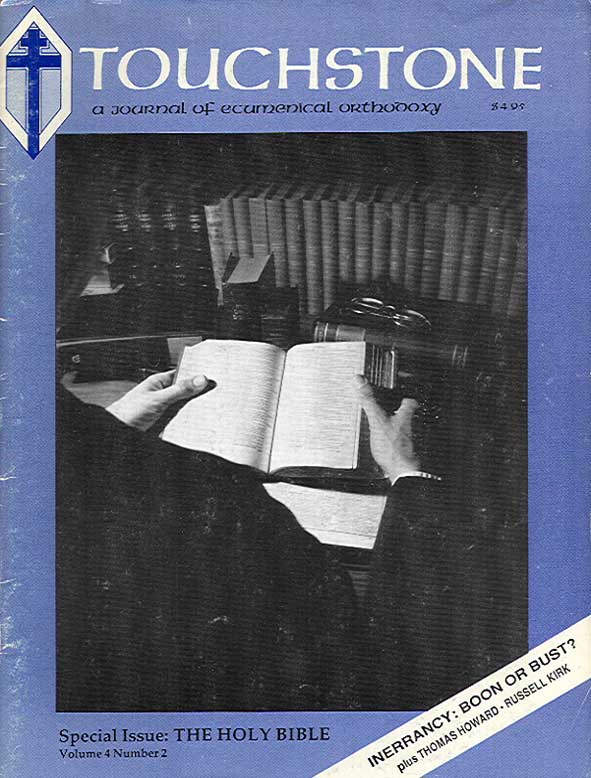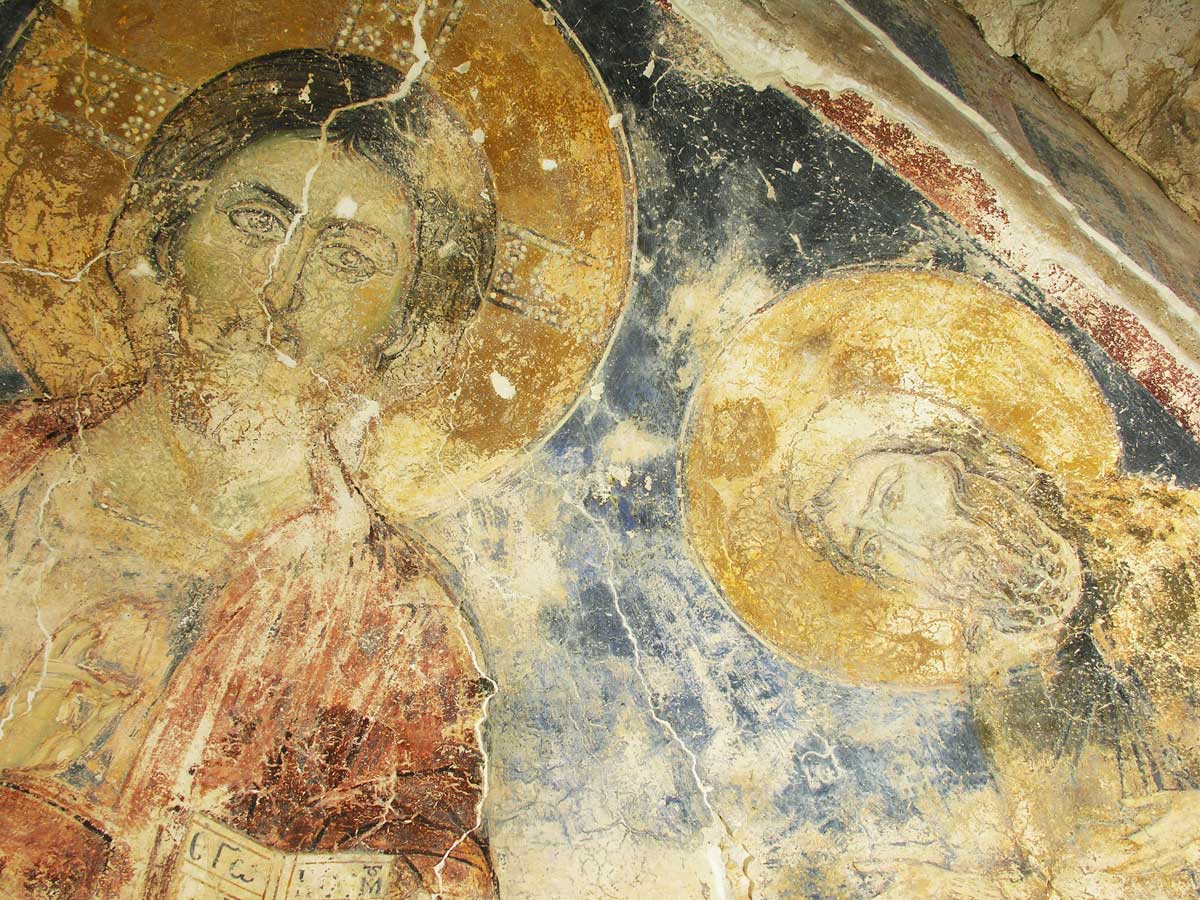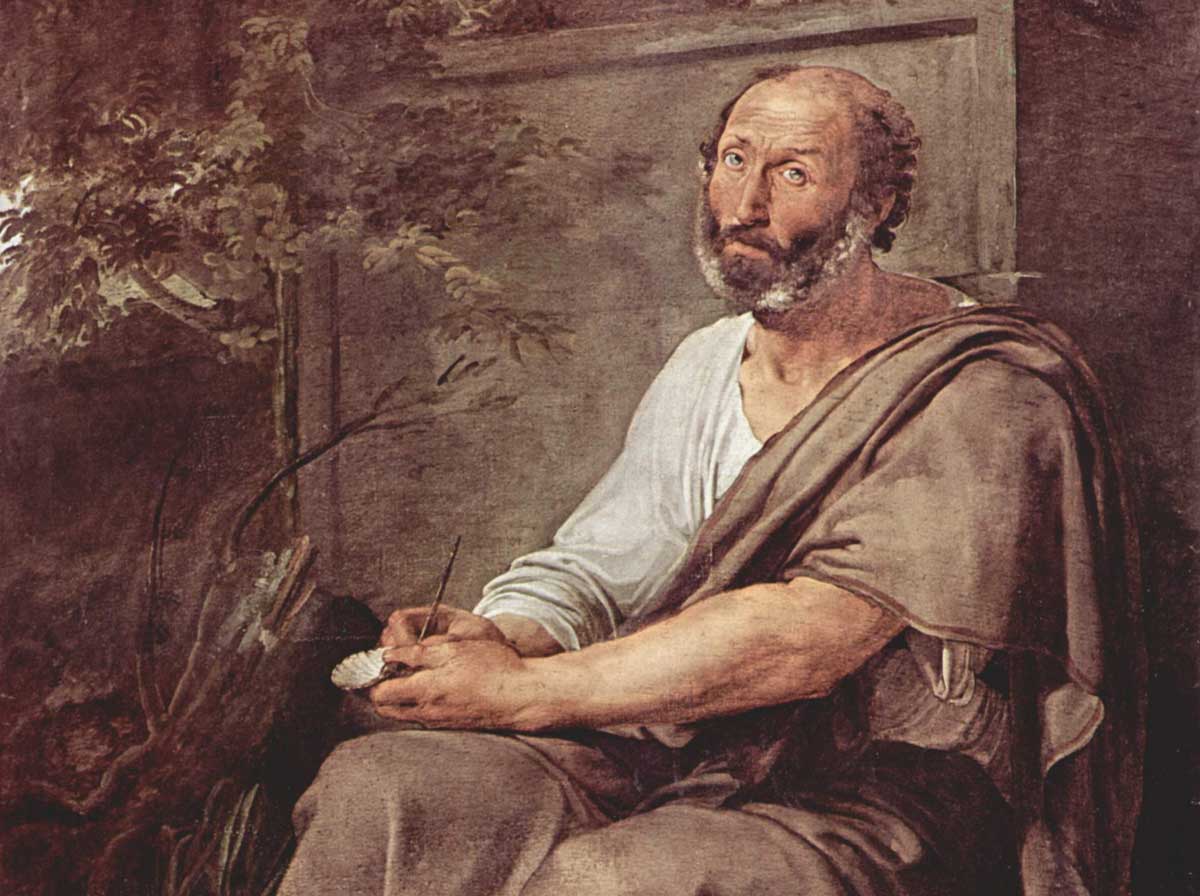Beyond Sola Scriptura
Recovering a More Balanced Understanding of Authority
by Victor L. Walter
In the theological battle over inerrancy of the Holy Scriptures late twentieth-century Protestants may at times obscure the practical issue of the authority of the Bible over the daily thought and life of the believer. The subject of this article is the nature of that authority of Scripture and its relationship to those other aspects of divine authority which should mark the lives of Christians—the echoing voice of historic Christian orthodoxy as expressed in the great ecumenical councils of the early undivided Church,1 and the effective headship of Christ in the context of living Church authority. Now this is a classic three-legged model of Christian authority and far less susceptible to doctrinal manipulation or distortion by heretics, cultists, or the ignorant than a flat view of sola scriptura, the “scripture alone.” As I reflect on this three-legged model, I am often tempted to insert a fourth leg of the teaching role of the Holy Spirit (John 16:13–15), though it is implicit in all of the other three. I will leave it to the reader to decide which multi-faceted model is more helpful. But let me review how this thinking worked itself out in point of historical fact in the early Church.
Not many in the early Church were inclined to challenge the concept of the divine inspiration of Scripture. The starting point for their definition of inspiration began in passages like 2 Timothy 3:16–17: “All Scripture is given by inspiration of God and is profitable for doctrine, for reproof, for correction, for instruction in righteousness, that the man of God may be complete, thoroughly equipped for every good work.”2 Unlike our own age, where the issue for many seems to be the reality of that divine breath of revelation, the issue in the early Church was to determine which books exactly should be included in the canon as divinely inspired. The late first- or the second-century “undershepherd”3 sat before a study table that had on it the Gospel of Matthew and the Gospel of Thomas, the Acts sent by Luke to Theophilus and the Acts of Peter, the Epistle to the Galatians from Paul and the First and Second Epistles of Clement. The burning issue for him was to answer definitively which were divinely inspired, that is, “God-breathed.” Early debaters of this issue resolved the problem gradually over the decades4 by applying the Holy Spirit’s teaching through Paul: that was to be considered genuine Scripture which proved unfailingly efficacious in the life of the Church to establish and maintain apostolic doctrine, which continually furthered righteousness and provided for the thoroughly equipped undershepherd. Eventually Matthew, Acts and Galatians were validated along with the other twenty-four books of the New Testament canon;5 and Thomas, Acts of Peter and Barnabas along with several dozen other assorted gospels and epistles were seen as non-canonical.
Thus the Holy Bible, which we may say serves us as the first plank in our Christian platform of authority, was clearly set in place as the local churches of the Roman Empire gradually worked out the Pauline dictum in daily ecclesiastical life. This gave rise to a later corollary expressed by Roman Catholics in their suggestion that it was the Church’s preservation of Divine Tradition out of which the Scriptures come.6 This suggestion has always left Protestants a bit uneasy. And while I can appreciate this feeling of uneasiness, I think that its source is our failure as American Protestants to know the history which we are in part discussing in this article. It seems to me that we need to come back to that historical process which led to the famous rule-of-thumb for doctrinal authority stated by Vincent of Lerins (prior to the synod of Orange in 529) that, “all possible care should be taken . . .” to “. . . hold that faith which has been believed everywhere, always, and by all.”7 This dictum highlighted the next significant issue in regard to Christian authority. That issue was the right interpretation of those authoritative canonical Scriptures.
At this point a second passage of Scripture charted the channel through which the flood waters of this controversy over the right doctrinal interpretation (drawn from the Scriptures) were to run. That passage was 2 Peter 1:19–21:
And so we have the prophetic word confirmed, which you do well to heed as a light that shines in a dark place, until the day dawns and the morning star rises in your hearts; knowing this first, that no prophecy of Scripture is of any private interpretation, for prophecy never came by the will of man, but holy men of God spoke as they were moved by the Holy Spirit.8
The line of reasoning seems plain here. Since none of the confirmed Scriptures came by the private and inventive will of man, but rather by way of the dictating or directive will of the Holy Spirit; therefore, none of the interpretation of these same Scriptures is to come by the private, individualistic, inventive will of man.9 If that is the case, where must one look for the proper interpretation of Holy Writ’s teachings? Emphatically the early Church answered that interpretation would be public within the Church. (Remember, the Apostle Paul says the Church is to be “the pillar and the bulwark of the truth.” [1 Tim. 3:15]) There were and would be no secret mysteries to Christianity known only to the exalted and favored few. Jesus taught in the public arena; the apostles lived, preached and died publicly; and saving faith was indeed for whosoever would respond and indeed a little child could lead in that response.10 They assumed quite naturally that public meant in the open ecclesiastical arena, not in the pagan schools of this or that secular philosopher. Therefore, under the Holy Spirit’s tutelage the Church would publicly set the interpretation of the Scriptures just as she had originally publicly selected the individual books of the canon. This understanding was undergirded by the promise in the Gospel of John that
. . . when He, the Spirit of truth, has come, He will guide you into all truth; for whatever He hears He will speak; and He will tell you things to come. He will glorify Me, for He will take of what is Mine and declare it to you. All things that the Father has are Mine. Therefore I said that He will take of Mine and declare it to you. (John 16:13–15)
The battle line that developed was over the question of just who was “the Church” and by what mechanism or agency within the Church would this dominical promise be kept. Later Roman Catholicism would answer that question emphatically by asserting the teaching magisterium of Peter continued in the pope at Rome.11 However that developmental strand at Rome was strong enough to agitate the North African church as early as the Severan persecution and the patriarchate of Cyprian at Carthage, A.D. 248–258. Writing his great Christian classic, De Unitate, our earliest treatise on the Church’s nature, Cyprian countered certain Roman claims and expressed the earliest impulse of the Church by insisting that the Church was her bishops or undershepherds in counciliar aggregate.12 One man alone was not entrusted with this power of definition, but rather the gathered, hence ecumenical, Church in the persons of her undershepherd bishops would be the final voice in interpretation.
It was this early answer defended by Cyprian which was expressed in the roster of ecumenical councils and which Protestants would much later rearticulate in their disallowance of a papal sovereignty over doctrine or practice. It was these councils which defined the cardinal doctrines of the Trinity, the Incarnation, the nature of Christ Jesus, the relationship of atonement and Deity, and marked out that plethora of early Church heresies which were to be shunned. It is the doctrinal decisions of these ecumenical councils which Protestantism accepted as historic orthodoxy.
subscription options
Order
Print/Online Subscription

Get six issues (one year) of Touchstone PLUS full online access including pdf downloads for only $39.95. That's only $3.34 per month!
Order
Online Only
Subscription

Get a one-year full-access subscription to the Touchstone online archives for only $19.95. That's only $1.66 per month!
bulk subscriptions
Order Touchstone subscriptions in bulk and save $10 per sub! Each subscription includes 6 issues of Touchstone plus full online access to touchstonemag.com—including archives, videos, and pdf downloads of recent issues for only $29.95 each! Great for churches or study groups.
Transactions will be processed on a secure server.
more from the online archives
calling all readers
Please Donate
"There are magazines worth reading but few worth saving . . . Touchstone is just such a magazine."
—Alice von Hildebrand
"Here we do not concede one square millimeter of territory to falsehood, folly, contemporary sentimentality, or fashion. We speak the truth, and let God be our judge. . . . Touchstone is the one committedly Christian conservative journal."
—Anthony Esolen, Touchstone senior editor









